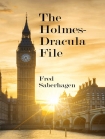The Dracula Tape, Fred Saberhagen [the dot read aloud TXT] 📗

- Author: Fred Saberhagen
Book online «The Dracula Tape, Fred Saberhagen [the dot read aloud TXT] 📗». Author Fred Saberhagen
Coming so very slowly and hopelessly up out of trance — I would not be in time, I knew, to act effectively in self-defense — I realized for the first time and with detachment that Harker had lost weight as my guest — his arms were thinner in their dirty sleeves — that his hair hung down disheveled around an evilly transformed face, that his shaving had been spotty at best during the weeks since he had lost his mirror.
“Bloody bastard!” he grated out again, and in the midst of that last word his voice broke on a sob. And with a little whining screech of indrawn breath he raised the spade, held it high in both hands for an edge-down swing straight at my face.
I am not boasting when I say I was not terrified. Later on I will discourse of fear. I say now only that I watched, unhappily, as that heavy blow came down. Impossible to do more than turn my head and try to glare at my attacker. The shovel struck in the middle of my forehead, and I took the shock and pain of it through my head, and tried to no avail to move my hands and feet, and thought that in a second more the blow would come again.
And Harker? What saw he? “… a mocking smile on the bloated face which seemed to drive me mad. This was the being I was helping to transfer to London, where, perhaps, for centuries to come he might, amongst its teeming millions, satiate his lust for blood, and create a new and ever-widening circle of semidemons to batten on the helpless … I seized a shovel … and lifting it high, struck, with the edge downward, at the hateful face. But as I did so the head turned and the eyes fell full upon me with all their blaze of basilisk horror. The sight seemed to paralyze me, and the shovel turned in my hand and glanced from the face, merely making a deep gash above the forehead.” In rebuttal I can only reiterate that the sight of Harker swinging a shovel at my head was somewhat perturbing to me as well.
Unnerved by my movement and by the failure of this first attack to destroy me, he let the shovel slip from his hands and it somehow brought the box lid slamming down, leaving me to wait in darkness for his next move. It is perhaps fortunate for those interested in this history that at this point our tête-à-tête was interrupted, by “a gypsy song sung in merry voices,” offstage but approaching, and accompanied by other noises of the Szgany who were coming with heavy wagons into the courtyard to begin my move. Harker fled back upstairs to scribble more into his journal. As soon as the coast was clear of gypsies he took the daring chance of climbing down the whole surface of the castle wall, and shortly got clear away upon his own initiative. My carriage rested empty that day, and Tatra put on his coachman’s livery for nothing.
Had my guest stayed with me a little longer and put his wits to work he might well have done me serious or even fatal damage. Of course a simple attack with a metal tool was doomed to fail, a point Harker might profitably have remembered later, when he and I resumed our social intercourse. By now the mark has entirely disappeared from my forehead — wouldn’t you say? — or at least my fingers can no longer find the ridgelike scar, and no one has remarked upon it for some decades.
But I had been given a throbbing head, and some fresh food for thought, viaticum for my journey; I was in no state to communicate with the loyal Szgany as they nailed down my lid and began to roll me down the long road to the sea.
Track Two
My overland journey, some five or six hundred kilometers across the Transylvanian Alps and eastward through the banat, the fertile plain, was uneventful. Once out of the mountains the roads were good, and my Szgany made good time with their wagons.
The sun of early July beat down upon my box as we passed through the city you call Bucharest — did you know I named it Cetatesa Bucurestilor, in 1459, when it was one of my important fortresses? For a time it was my capital. We crossed the Danube shortly thereafter, and by the evening of July fifth we were in Varna, on the Black Sea, from which port I would take ship for England.
Varna. I suppose the name means little or nothing to you now. In 1444, in a battle fought nearby, the young King Vladislav III of Poland died under Turkish swords, and Janos Hunyadi himself was lucky to escape the field of battle alive, with the aid of my Walachian kinsmen.
No, I was not there. I was thirteen years old in 1444, and already fighting battles of my own, without an army for support. When the Christians and the Turks fought near Varna I was away amid the mountains of Asia Minor, in Egrigoz, a hostage for my father’s cooperation with the Turks; imprisoned with me was my brother Radu, the one they called the Handsome later, who then was only six …
Can you picture me as a child? No more than Hitler, I suppose. But all who have at any time been human have traversed that phase, and I remember it. As the twig is bent … Great twig benders were those Turkish jailors of my





Comments (0)